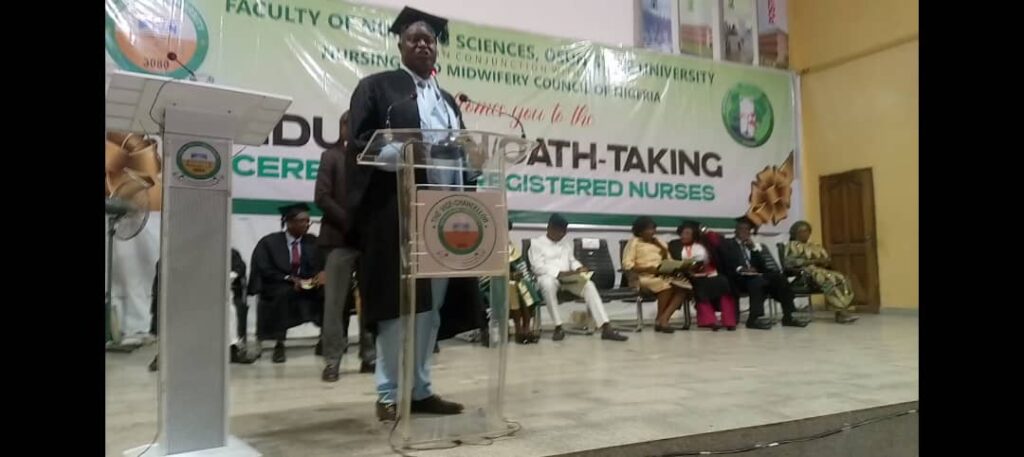The Vice-Chancellor of Osun State University (UNIOSUN), Professor Odunayo Clement Adebooye, has reaffirmed the institution’s commitment to excellence in healthcare education as 92 newly qualified Nurses were inducted into the profession.
He disclosed this at the 7th Nursing Induction Ceremony held on Tuesday, August 26, at the Olagunsoye Oyinlola Auditorium’s main campus, Osogbo.
In his address, Professor Adebooye extended appreciation to the Nursing and Midwifery Council of Nigeria (NMCN) for approving the increase of UNIOSUN’s admission quota from 150 to 200 students, describing it as a reflection of confidence in the University’s capacity to produce globally competitive health professionals.
“This singular gesture reflects your confidence in our University’s capacity and commitment to the training of highly skilled, competent, and globally competitive Nurses. We are deeply grateful,” he said.
Highlighting the University’s investments to strengthen its Faculty of Nursing, Adebooye noted that additional qualified lecturers had been recruited, facilities upgraded, and laboratories expanded to accommodate the increased quota.
He emphasised UNIOSUN’s determination to remain a leading force in healthcare education.
Addressing the inductees, the Vice-Chancellor charged them to see their new role as a sacred calling, urging them to serve humanity with compassion and be worthy ambassadors of the institution.
“You are not just Nurses; you are healers, comforters, and custodians of hope. I implore you to put people first and ensure patients feel seen, heard, and valued,” Adebooye admonished.
Delivering a lecture on “Compassion in the Age of Artificial Intelligence”, the Guest Speaker, Professor Prisca Olabisi Adejumo, Dean of the College of Nursing, University of Ibadan, acknowledged both the advantages and challenges of integrating AI into nursing practices, such as concerns over data privacy, security, and the need for effective interoperability among healthcare systems.
“AI is a tool to aid us, not a replacement,” she asserted, reinforcing the idea that emotional intelligence and personal connections in healthcare are paramount.
Professor Adejumo discussed the potential benefits of artificial intelligence (AI) in enhancing patient care while emphasising that compassion and human connection remain irreplaceable qualities within the nursing profession.
She noted that while AI offers opportunities in healthcare, such as automation of routine tasks, medication management, diagnostics, and personalised care, it cannot replace the compassion and emotional intelligence that define nursing.
“AI should be viewed as a cooperative technology, not a replacement. It can assist in workload reduction, dosage calculations, and health prevention, but compassion remains the timeless fabric of nursing practice,” Prof. Adejumo said.
She, however, cautioned on challenges surrounding AI adoption, including data privacy, interoperability of health systems, infrastructural costs, and ethical considerations in patient care.
Best Graduating Student, Adeyemi Esther Aderonke, also received an award for academic excellence.
In her remarks, Aderonke expressed profound gratitude to the University, her lecturers, and her parents for their guidance and support, pledging to uphold the values of the nursing profession.















